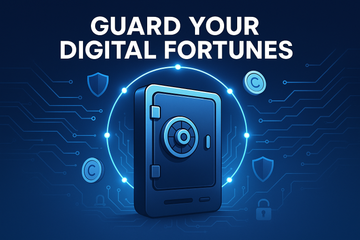Imagine this: You've stepped into the world of cryptocurrencies, where each digital coin is a tiny piece of your financial empire. Yet, in this vast and volatile arena, safeguarding your assets is tantamount to chivalry in the medieval times. The champions of such guardianship are hardware wallets, the trusty custodians in the self-custody movement. Let’s unravel their significance, shall we?
A New Era of Autonomy
In the bustling realm of digital currency, self-custody is like claiming your spot in a crowded café—finding the cozy nook that’s entirely yours. This movement underscores the shift towards personal autonomy, echoing a time-worn desire to be in control. It’s about grasping the reins of your financial destiny and not letting go.
But, here's a curveball: are you willing to entrust this newfound autonomy to centralized exchanges? Notably, these platforms have their merits—convenience, liquidity, and whatnot. However, they stand on the opposite end of the self-custody spectrum, occasionally casting shadows of vulnerability.
Enter Hardware Wallets
Ah, hardware wallets—think of them as the tangible vaults within your digital landscape. Brands like Trezor and Ledger have etched their names in the annals of crypto security, providing the peace of mind akin to seeing your last cookie safely stashed away.
Their charm lies in their ability to store cryptocurrency offline. It's like keeping your treasure chest not only locked away but hidden under loose floorboards—secured from the prying eyes of cyber pirates and malevolent hackers. With no permanent internet connection, these devices minimize the exposure to online threats. It's isolation in the best sense.
Why They're Worth Their Weight in Crypto
Why opt for a hardware wallet when there are digital ones aplenty? Well, consider this: security isn’t just a feature; it’s a philosophy. Hardware wallets stand out by mandating physical confirmations for transactions, akin to a secret handshake only you know.
Moreover, they carry backup and recovery options through mnemonic phrases. Should you ever misplace your wallet or accidentally wash it with your laundry (weird, but it happens!), your assets remain recoverable.
Are Hardware Wallets Foolproof?
No guardian is without its chinks. While hardware wallets elevate security, they aren't infallible. Backups are essential and the loss of access keys can still lead to financial devastation. Furthermore, the initial learning curve might seem steeper than Mount Everest for the uninitiated. Patience and caution are imperative. It’s like learning to ride a bike—wobbly at first, smooth sailing after.
Regrettably, there’s also the human element—scams and phishing attempts persist. Ever received those texts that suspiciously claim your cousin needs funds urgently? Such cons exist here too, warning the crypto stalwart to be ever-vigilant.
Complementing Digital Dynasties
While diving into self-custody, it’s worth pondering whether hardware wallets can completely replace other forms of storage. Truth be told, they’re more of a dynamic duo than a solo act. Complementing hot wallets, they offer a balanced approach—securing vast reserves while allowing agility for everyday transactions.
Consider a typical evening: a glass of wine, a comfy chair, and you’re browsing digital marketplaces. A hardware wallet ensures that your day-to-day activities aren’t relegated only to security but a harmonious blend of convenience and protection.
Whose Hands are Safest?
If you’re itching to join the self-custody ranks, here’s the million-satoshi question: Which hardware wallet should you enlist as your trusted ally? Trezor’s ease of use and Ledger’s wide array of supported coins make them strong contenders.
Though they sit atop the hill of crypto protection, it’s crucial to match your choice to your needs. Are you a tech whiz needing myriad functionalities? Or perhaps a newcomer seeking straightforward security? The perfect fit exists—like finding the pair of jeans that both fit and feel great.
Parting Thoughts: Your Crypto’s Workplace Attire
As we shepherd our financial futures into the digital age, remember that hardware wallets are more than just tools—they’re the stewards of self-sovereignty. They stand as a symbol of our refusal to yield control over our hard-earned assets without our explicit say.
And therein lies the essence: protection not just as a necessity, but as an empowering choice. Here’s to reclaiming our financial autonomy, one secure storage at a time. Ready to don your wallet and stride into the crypto frontier?











